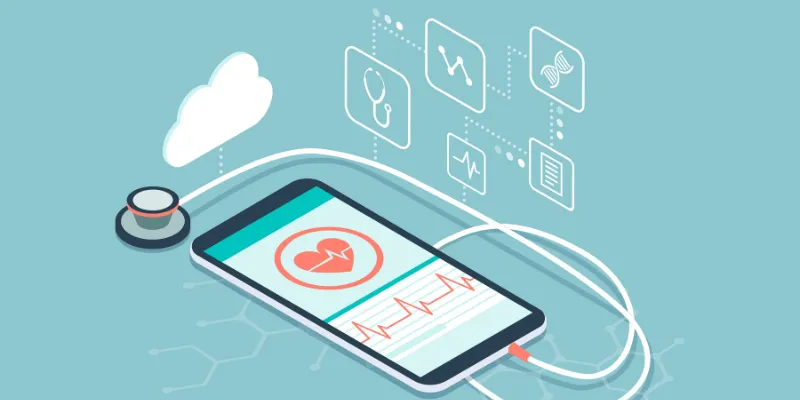[TechSparks 2020] COVID-19 is more like a demonetisation-moment for healthcare, say experts
At TechSparks 2020, Co-founders of MFine and MediBuddy DocsApp dive deep into understanding disruptive technology in the healthcare space and how the sector would look like in the future.
The COVID-19 pandemic has challenged the healthcare infrastructure of countries like never before. It has established the need for an agile and scalable healthcare ecosystem in India. In a short span of time, Indian healthcare startups have taken this challenge and are driving innovations in the space.
At YourStory’s flagship event, TechSparks 2020, a roundtable consisting of the leaders of the startup ecosystem dived deep into reimagining the future of healthcare in a hyperconnected world. The roundtable was moderated by Amitabh Nagpal, Head of Startups at AWS. Speakers Ajit Narayanan, CTO and Co-founder at MFine, and Satish Kannan, Co-founder and CEO of MediBuddy DocsApp, provided intelligent insights on how the future of healthcare will look like in India.
“If we have to solve the healthcare problem of 1.5 billion people, we have to take significant advantage of technology and take the reach that mobile phones are giving to people. Mobile phones are becoming kind of medical devices now,” Amitabh said.

While MFine and MediBuddy DocsApp are building applications that are solving for lack of healthcare infrastructure in India, Amitabh further questioned them on the what, why, and how part of it.
Satish said, “COVID is more like a demonetisation moment for the adoption of digital healthcare.”
He further added that high adoption of digital technology in India is due to the presence of a younger population when compared to other countries. He said, in a couple of years, there would be one smartphone for every family -- a gateway to access multiple services.
Solving for connected ecosystem
The building blocks of the healthcare ecosystem consist of patients, providers, doctors, and caregivers. How are players like MFine and MediBuddy DocsApp solving for the connected data that flows from one end to the other?
“The access to good quality healthcare, by its very nature, is challenging,” Satish said. He goes on to explain that the number of doctors we have is very few. Additionally, all the top doctors are associated with the top hospitals and in the top cities. The very need for a digital healthcare solution is very critical.
“With the growth of smartphones and better internet connectivity, people are now able to start accessing a lot of services through digital devices, and healthcare is the right area to start using it,” he added.
Satish said, at MediBuddy DocsApp, the team looks at it from a customer’s point of view. From needing health advice to understanding the health problem, interacting with a doctor, and finally getting to a medicine or a lab test – it covers all parts of the healthcare ecosystem. Thus, “digital becomes an apt way to connect all the medical stakeholders together - making high quality healthcare accessible to everybody,” Satish said.
Ajit agreed and said, “Access to quality healthcare is a challenge in India. The doctor to patient ratio is startling in India.” Secondly, once accessibility is managed, how would one ensure quality? How would a player guarantee clinical outcomes?
And finally, Satish believes, healthcare as an ecosystem is something that nobody wants to interact with. “It’s not a happy interaction. To make that whole process smoother is something that we are trying to solve,” he added.
Therefore, it is an interconnected play of different providers. For MFine, the providers are hospitals and doctors. Additionally, the startup also connects with diagnostic and radiology labs and pharmacies. “In the future, one could also imagine fintech companies becoming a part of the system -- insurance, on the spot loans, etc. It is essential that the data flows between all of them,” he said.
He further said that in the future, one can expect all these providers to have data of their own. “We are aided by a sudden impetus in the ecosystem right now because of the pandemic. Players like us want to solve this issue. There is also a mindset from the government to push standards and make this process happen,” Satish said.

Healthcare versus sick care
Whenever we talk about healthcare, there are two things that come to our mind -- healthcare and sick care.
What is the right way to solve the needs of 1.3 billion people? At a public policy and corporate perspective, should one reimagine healthcare in the country?
Ajit said, “Today, we are in the sick care direction. Your thought of healthcare comes when you are sick or immobilised for some reason. That is when you really think of healthcare.”
Customers, beyond a certain age limit, start thinking about healthcare and become cognizant of it. “Today, India is the non-communicable disease capital of the world. We are adding more cancer patients than anywhere else. It is the diabetes capital, lifestyle diseases are all over the place. Changing lifestyles and urbanisation is further adding to that,” he explained.
He believes that as a country, we have to do a massive shift to think of healthcare as opposed to sick care. It needs a fundamental change in the approaches of providers. MFine is heavily rooting for the preventive healthcare direction as a way in which consumers need to think about healthcare. It is thinking about ways in which consumers can bring in their families and think about their family as a whole and think about healthcare holistically.
“It cannot be sick care anymore, it’s too late for that,” Ajit said.

Changing behavioural patterns
COVID-19 has accelerated healthcare innovations like never before. But what exactly happened in the tech space, and what are the technology weavers?
To this, Satish said, “These concepts existed for a very long time. About how all of this can be supported through a digital medium. Now is the right time and the ecosystem is right.”
He added that before the pandemic, behavioural changes were happening in terms of increased smartphone penetration, decreased cost of internet data, UPI and digital payments penetration. And all of these significantly helped digital healthcare to grow.
Satish also discussed the three things that have significantly changed in the healthcare domain, post-COVID.
First, the behaviour of the customer has changed. Usually, in cities, customers drive down to their nearest hospital to visit the doctor. “However, now, if there is a child or elderly person at home (who are at a higher risk for severe illness from COVID-19), one would ideally not want to go to the hospital. But first, consult with a doctor online,” he explained.
Secondly, the behaviour of doctors and providers has also changed. Earlier, the need for adoption of technology was lower, because every patient would anyway come to the hospital. But now, doctors have realised that the number of patients coming to the OPD has become lesser. “The behaviour of doctors and hospitals, and the adoption of technology has been significantly accelerated,” Satish added.
Thirdly, regulations have changed. He said that the Indian government has been very progressive.
“My team and I have been working on the telemedicine guidelines for five years...but now, post the lockdown, within 30 days we had new telemedicine guidelines come and a lot of regulatory improvement happened in a burst,” Satish said.
These three coming together, post COVID, is further accelerating digital healthcare technologies in India.
Tech in healthcare
Speaking of the leading technological changes that have taken place, Ajit said that the fundamental thing is that the digital infrastructure is already being present at this point.
“During the early days of ecommerce, one was battling with a lot of things -- digital infrastructure, which did not exist, and the internet itself was accessible to a few people only, data was expensive and the savviness of the consumer in the digital world did not exist. A lot of those companies have paved the way for us to reach here,” he added.
Second, the computing power has started to become cheaper and more distributed. What existed in closed walls of big corporates or cloud are now sitting on the customer’s device. “Mobiles can now be used as a powerful (medical) examination device. A digital health device is there in the hands of everyone, both doctors and consumers. That’s massive,” Ajit said.
Thirdly, a lot of algorithms are available today, which are higher order in nature. “We do not have to go tweaking the bare bones of technology. A lot of services are there that can be used to build interesting news cases on top of it...unimaginable solutions are now available,” Ajit said.
Fourthly, consumers have become technologically savvy and providers have become digital.
Road ahead
Speaking on how the future looks for the healthcare ecosystem, Satish said, “The ecosystem will become more customer centric.”
Healthcare today is provider or care-giver focused. Once it becomes customer centric, it will ensure that the right information reaches the customers, and once that happens, healthcare will be more like personalised care.
“Over time, there will be health IoT devices in houses...The only way to personalised care is through the use of AI and technology,” he added.
Ajit, on the other hand, said that MFine is rather ambitious and aims to have a doctor or care-giver for every patient in the next five years.
“A doctor in the hands of every Indian, that is what we would like to call it,” he added. Ajit further explained that this would be a mix of human doctors and assistive technology.
Further down the line, in seven to eight years, sensors will be available in all places, that is, wearables will become more prevalent.
TechSparks - YourStory's annual flagship event - has been India's largest and most important technology, innovation, and entrepreneurship summit for over a decade, bringing together entrepreneurs, policymakers, technologists, investors, mentors, and business leaders for stories, conversations, collaborations, and connections that matter. As TechSparks 2020 goes all virtual and global in its 11th edition, we want to thank you for the tremendous support we've received from all of you throughout our journey and give a huge shoutout to our sponsors of TechSparks 2020.
Edited by Megha Reddy


![[TechSparks 2020] COVID-19 is more like a demonetisation-moment for healthcare, say experts](https://images.yourstory.com/cs/2/11718bd02d6d11e9aa979329348d4c3e/Imageqks3-1605703844361.jpg?mode=crop&crop=faces&ar=2%3A1&format=auto&w=1920&q=75)
![[Startup Bharat] Telemedicine may be on the rise, but is it reaching rural India that needs it the most?](https://images.yourstory.com/cs/2/3fb20ae02dc911e9af58c17e6cc3d915/Telemedicinefeature-1584019628275.png?fm=png&auto=format&h=100&w=100&crop=entropy&fit=crop)






